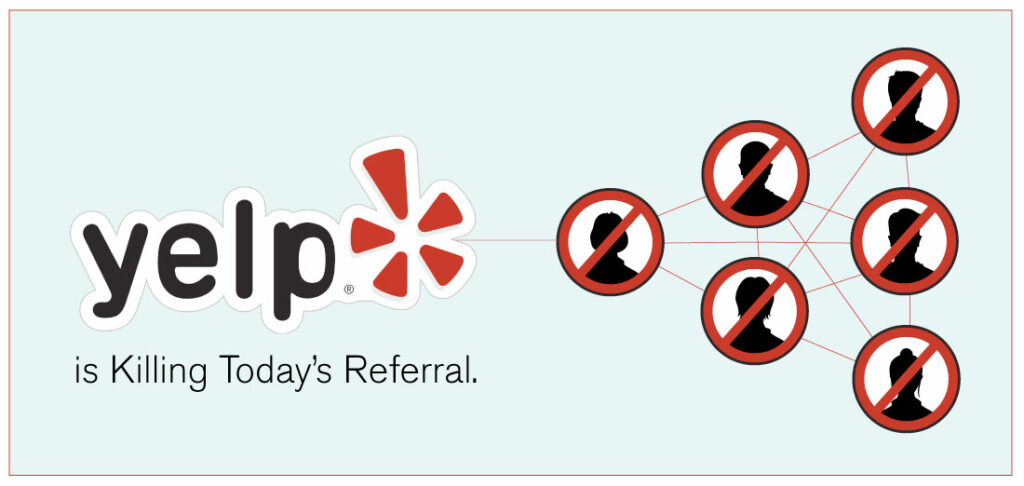Today’s online reviews are yesterday’s word of mouth referrals. But one review site you may have heard of called Yelp could be ruining that.
Businesses small and large have become reliant on online reviews when it comes to managing their business’s online reputation—they can help retain current customers and attract new business.
Some industries like the food and hospitality industry tend to get Yelped very easily. Other businesses in industries like housekeeping, real estate, or auto repair may struggle to get a fraction of the volume of reviews that food and hospitality industries garner. As a result, service-oriented businesses have to sort of encourage their customers—those who have had both positive and negative experiences with the brand—to leave them an online review.
In 2017, 97% of consumers said they used online reviews, according to the Local Search Association. 68% of survey respondents wrote a business a review when they were asked—74% were asked in the first place.
However, last year Yelp took serious steps to put the kibosh on that, going as far as sending out consumer alerts to businesses that had reportedly been soliciting reviews. It’s a move that when paired with the site’s questionable review filtering algorithms, could hinder some small service-oriented businesses that naturally get reviews from their customers.
In fact, the site is issuing “search ranking penalties” to businesses requesting reviews from their customers even if there is no reward attached—penalties will demote a business’s search rankings on the platform and hurt their overall reputation on the site.
“To me it’s more of a process of 10 years ago when you would ask for referrals,” says Shaun McCarthy, owner Handyman Connection of Colorado Springs. “Same kind of concept really. Isn’t that okay? Isn’t that a part of business? ‘Hey, we did a good job for you, is there anybody else you can send us to?’”
About a year and a half ago Shaun took over the company and says that he and the previous owner are surprised by how quickly online reviews have become a regular part of business.
“It’s just exponentially greater, the entire process of going out to get reviews and how you have to manage it more than you did five years ago.” Shaun continues, “So it’s been an important part of our overall marketing strategy of brand recognition. Online reviews are definitely something we spend some time with.”
He does want to be fair, though: Shaun understands that Yelp is trying to create organic content and he agrees that companies asking for positive reviews in exchange for rewards should be cracked down on.
In Yelp’s blog posts about the subject, they claim to have largely done just that. We at WebPunch thinks offering rewards for positive reviews is unequivocally and absolutely unethical and they should be targeted and dished out consequences.
But, what about just asking? That seems to have gotten lost in the mix. Why shouldn’t businesses be able to at least ask for honest feedback? Good or bad. Bring it on!
There’s also the notion that consumers will only take the time to write a review if they’ve had a crummy experience. According to some studies, (including this one), Yelp has more negative reviews among its content than any other review platform. Yikes!
People want somewhere to go where they can gripe. They want someone to blame for their rude server or wildly late handyman inappropriately talking about his latest doctor appoint. Customers are less inclined to take the time to review a positive experience they had with a business. Instead they take their experience with them, tell a few people, and carry on.
So what’s the harm in a courteous reminder? It’s just a nudge to a customer thanking them for their business and asking for that referral if they were happy or feedback on how they can improve in the future.
To add to Shaun’s frustration, Yelp’s review filter has held back 13 reviews of his Colorado Springs location; 11 of them being five stars.
“I say put the bad and the good out there and let me deal with it.”
When asked about whether or not Yelp took into consideration the fact that consumers are less likely to review a service-oriented business and sometimes those customers need a reminder, one of their PR spokespersons said that was a good question and that they discourage any and all solicitation—they think it creates biases.
They also linked their guide to success for businesses, which consists of two steps: Provide the best experience and engage with your customers. Below it says “Don’t interfere with the natural flow of reviews.”
Well, gee. Thanks?
Yelp will do what they want. But businesses should take this move seriously because they claim that soliciting reviews, even without a reward attached, could deteriorate your business’s rating and overall online reputation. For those service-oriented businesses, there are plenty of other review platforms out there like Google, Angie’s List, Capterra (for software companies), Thumbtack, and HomeAdvisor. Sites like those seem to really get their industry and we think are more worth a service-oriented business’s time.

Matthew Van Deventer is a content creator for WebPunch. As a dealer of words he dabbles in journalism and loves a good story, whatever the medium. Matthew lives outside of Denver, CO with his wife, daughter, and pup, Chewy.


